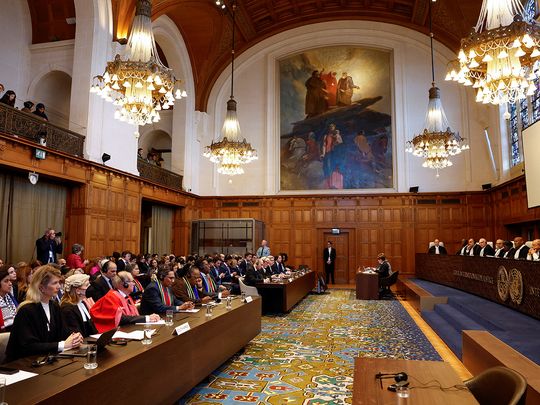
Nicaragua has brought a case to the International Court of Justice (ICJ), accusing Germany of violating the UN genocide convention by supplying military equipment to Israel and halting funding to the UN’s aid agency. Nicaragua also accuses Germany of politically, financially, and militarily supporting Israel during the Gaza conflict. The case centres on whether Germany failed to prevent genocide rather than directly committing it.
Germany has responded to the allegations by Nicaragua, stating its rejection of them at the ICJ in The Hague. Germany’s lawyer, Tania von Uslar-Gleichen, has emphasised Berlin’s commitment to international humanitarian law and principles, attributing its support for Israel to its historical responsibility, particularly in the context of the Nazi Holocaust against Jews.
Germany has also stated that since Oct. 7, 98 per cent of its arms exports to Israel consisted of general equipment like vests, helmets, and binoculars, with only a small portion being war weapons for training purposes. Additionally, Germany emphasised its substantial humanitarian aid to Palestinians.
Chancellor Olaf Scholz of Germany supports Israel’s ‘right to self-defence’ but also faces increasing domestic pressure to halt arms sales to Israel. Critics of Nicaragua’s case point out the country’s human rights issues under President Daniel Ortega’s government. However, the case at the ICJ is whether Israel’s actions in Gaza constitute genocide under the Genocide Convention, and if so, whether Germany’s support for Israel violates the Convention or not.
Question of accountability
Nicaragua’s lawyers have requested the ICJ to order Germany to cease arms sales to Israel and resume funding for Palestinian refugees through the UNRWA. The case’s preliminary stage is focused on the existence of Germany’s military aid rather than its quantity or types. An ICJ ruling on Nicaragua’s request for emergency measures is expected soon, while a final judgement on the case’s merits may take time.
Germany argues that the ICJ lacks jurisdiction over the case, as it primarily focuses on alleged violations by Israel and has not yet ruled on Israeli actions in Gaza. While Germany staunchly defends its support for Israel, Nicaragua’s legal challenge raises complex questions about international law and political alliances. The outcome of this case could have significant implications for how states navigate their obligations under international treaties.
The perpetration of any genocide is one of the most egregious violations of human rights, leaving scars on humanity that endure for generations. In the aftermath of such atrocities, the question of accountability arises not only for the perpetrators but also for those who support them.
Throughout history, genocides have often been facilitated by external support. The Holocaust, for instance, saw the complicity of various countries through silence, collaboration, or active support. Similarly, during the Rwandan Genocide, neighbouring countries provided sanctuary to perpetrators and even contributed to the violence. These examples underscore the interconnectedness of global affairs and the role of external actors in exacerbating or mitigating genocide.
Supporting nations bear a moral responsibility to prevent genocide, not only because of their commitment to human rights but also due to the ethical imperative to prevent mass atrocities.
Encouraging greater scrutiny
International law, through conventions such as the Genocide Convention of 1948 and the Responsibility to Protect (R2P) doctrine, imposes obligations on states to prevent and punish genocide. While these legal frameworks primarily target the perpetrating state, they also recognise the responsibility of other states to take action. The principle of “non-assistance” prohibits states from aiding or abetting genocide, holding them accountable for their complicity in international crimes. This legal foundation provides a basis for holding supporting nations liable for their contributions to genocide.
In addition to moral and legal considerations, there are practical reasons for holding supporting nations accountable. Genocide often occurs within complex geopolitical contexts, where alliances and strategic interests shape international responses. Holding supporting nations accountable also fosters accountability within their own societies, encouraging greater scrutiny of foreign policies and promoting a culture of human rights.
In confronting the complexities of genocide, the case at the ICJ by Nicaragua against Germany underscores the profound moral, legal, and political dimensions inherent in addressing mass atrocities. While the primary responsibility for genocide lies with the perpetrating state, the accountability of supporting nations cannot be overlooked.
As the legal proceedings unfold, and should the International Court of Justice (ICJ) classify the extensive humanitarian crisis in Gaza as genocide, it becomes increasingly clear that holding supporting nations accountable is not only a matter of justice but also a critical step toward preventing future atrocities.









